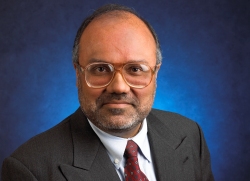IoT remains important to businesses; implementation still complex

Syed Zaeem Hosainchief technical officer, Aeris
I had the pleasure of participating in the 2017 IoT Evolution Expo East where I served on two panels and gained valuable insights from industry peers during various talks, presentations and social functions.
One thing I validated is that more and more people — from developers to CEOs — are realising that the Internet of Things (IoT) is important to their business and that implementing an IoT solution in not as easy as they thought. The challenges developers and decision makers face all tie into the complex nature of IoT challenges, such as the large amounts of data IoT devices and applications yield and how this data should be organised, analysed and secured.
To help make sense of the IoT and where it is headed, here are my three key takeaways from the 2017 IoT Evolution Expo East that you should consider when you design and implement an IoT solution, says Syed Zaeem Hosain, chief technical officer, Aeris.
No. 1 – IoT solutions must be customised to increase revenue and scalability
IoT solutions aren’t plug-and-play. You cannot simply go to the store and purchase a comprehensive IoT solution, and for a good reason: every operation has unique variables that will determine important aspects of its IoT solutions. For businesses to profit from an IoT solution, you need to determine the value that implementing an IoT solution will bring to their organisation.
- Will it increase revenue?
- Or will it reduce operational costs?
Answering these questions before seeking out an IoT solution will help you communicate with IoT developers and suppliers to get exactly the solution your operation needs.
For example: let’s say you decide to implement an IoT solution to make your remote data gathering and analysis more scalable. Whoever is designing the IoT solution must consider the various nuances involved:
- What data is needed to have to understand a process?
- How far must this data travel?
- What pieces of data can we look at over a period of time to gain key insights that will allow further scalability?
Answering these questions will allow you to customise your IoT solution:
- The data transport method that should be used;
- The necessary sensors required to collect relevant data; and
- How that data should be collected, structured and organised to provide insights.
No. 2 – Data monetisation: New potential markets for IoT
A question that I noticed had more prominence at this conference than at previous ones was how can data be monetised? At the 2017 IoT Evolution Expo East, there was a lot of theorising whether companies can make revenue by monetising their collected data, which can create complications related to ethics, privacy and trust.
- Can organisations sell information in an accessible format where people would be willing to pay for it?
- What are the ethical issues related to privacy and security?
Some IoT solution providers assume that they can just gather data from their customers and give it away … or charge for it. But if customers find out that an organisation is using, or even worse, selling their data without their permission, they could face legal risks.
But what if organisations offered their customers money to collect your data?
There is still a lot of ground to be covered when it comes to monetising data, but if customers had a monetary incentive, i.e., sharing in the revenue, to provide data to a company, everybody could potentially benefit from richer data and new market structures of buying and selling this data.
No. 3 – IoT Security must be standardised
Security has been a concern since IoT was developed. However, this past year we have seen an increased effort to standardise security across the IoT landscape. One of the panels I was on was called “HIPAA for IoT.” We wanted to explore if we could use the same security and privacy protections HIPAA brought to the medical industry for IoT.
In this panel, we discussed how to provide responsible solutions that allow people to trust IoT systems instead of fearing that using IoT devices will leak their personal data. Including the standards that are going to help manufacturers make their IoT devices secure enough for widespread enterprise use?
Certification was another major topic on one of the standards panels I attended. Even if we as an industry can agree on standards, how do we independently certify applications against that standard? A conclusion we came to was that the industry as a whole can’t always count on manufacturers to self-certify, because sometimes they get so focused on making a design happen that security isn’t their primary concern.
What we really need is industry-wide standards for security and privacy, and certification for those standards separate from manufacturers.
When choosing a developer and implementing an IoT solution, it can be difficult to keep track of all the changes in this fast-moving industry.
The author of this blog is Syed Zaeem Hosain, chief technical officer, Aeris
Comment on this article below or via Twitter @IoTGN
